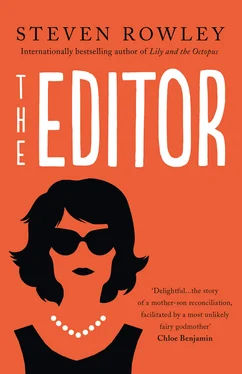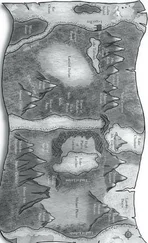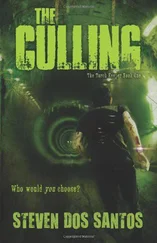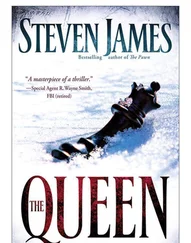I’m almost impressed with her logic. “Res ipsa loquitur.”
“What?”
“Never mind.”
“What.”
I sigh. “It’s Latin. The thing speaks for itself.”
It’s surprising to me that this is now her concern. When I asked her to read it the first time, she was quite adamant that the mother character was not her.
“It’s not about me,” she had said at the time.
“It’s not?”
“No. And you know how I know? Because you don’t know me.”
It was the ultimate slap to the face. A son a stranger to his mother—how could he have written an entire book about her? A mother, a stranger to her son—she had let herself be observed but never seen.
Naomi was our mother’s defender at first. When I called to complain, she told me, “You would feel differently if things were reversed.”
“If I exposed something of myself?”
“That’s right.”
“You don’t think there are pieces of me on every page of that book? What do you think writing is?”
I remember she paused, not awkwardly, but like she was genuinely giving it thought. “I don’t think I ever considered it.”
At least I had ushered one ally over to my side.
“I don’t know why you’re so worried,” I say to my mother now, when we’ve been quiet so long I almost forget we’re still on the phone. The box of croutons is empty. “Nobody’s perfect. I think people will recognize that.”
“Certainly not in this family.”
“In any family.”
“I don’t—” My mother stops. “It too late now.”
I consider the world’s imperfections. Not even the world’s, our family’s. The way everyone has tacitly agreed to leave so much unspoken. Everyone, that is, except me.
“I don’t want to be written about. Let’s leave it at that. Good night, James.”
“Don’t you even want to know what she said? Mrs. Kennedy?”
The sound of another cabinet door closing and then things go quiet again. I’m almost certain I can hear her click off the kitchen light. “I want to go to bed. I’m tired.”
“It’s worth adding two more minutes to your day.” I almost add “promise,” but it’s not a promise I’m certain I can keep.
“I’m not tired from the day. I’m tired from forty years of my children.”
“Your children haven’t kept you up in years.”
“And yet here you are.”
I plow forward before she can hang up. “She said she admired the mother. She said the reason she responded to the book so strongly was because she admired the character at the heart of it.” I let that sit before emphasizing, “She was saying she admired you.”
I can hear my mother breathing, the labored way she used to when we were young and a migraine headache was bearing down. “And you believed her.”
There’s a click and then the line goes dead.

SEVEN Chapter Seven Chapter Eight Go Your Own Way: July 1992 Chapter Nine Chapter Ten Chapter Eleven Chapter Twelve Chapter Thirteen Chapter Fourteen Yesterday’s Gone, Yesterday’s Gone: November 1992 Chapter Fifteen Chapter Sixteen Chapter Seventeen Chapter Eighteen Chapter Nineteen Chapter Twenty Chapter Twenty-One Chapter Twenty-Two Everything Turned Around: December 1992/1993 Chapter Twenty-Three Chapter Twenty-Four Chapter Twenty-Five Chapter Twenty-Six Chapter Twenty-Seven Chapter Twenty-Eight Chapter Twenty-Nine Chapter Thirty Chapter Thirty-One Chapter Thirty-Two Chapter Thirty-Three What Tomorrow Will Do: May 1994 Chapter Thirty-Four Chapter Thirty-Five Chapter Thirty-Six Acknowledgments About the Author Also by Steven Rowley About the Publisher

My agent’s office occupies a small suite on West Fifty-Ninth Street. It’s cozy and dim; the wooden shutters are kept mostly drawn and the office is lit with Tiffany table lamps, giving it a soft glow. It has the requisite characteristics of what you think a literary agent’s office once was, and still should be: someplace where you’d like to curl up with a good book and read. And you could find plenty of them—books—as the walls of the main room where Donna sits are lined with dark walnut bookcases crammed with endless titles. The rest of the office is littered with stacks of dusty newspapers, old copies of The New York Times Book Review , and past issues of The New Yorker . Sometimes I have to move papers out of a chair just to sit down.
Donna usually greets me with the enthusiasm of a poodle who has been left home all day. Most of Allen’s business is conducted via phone and fax, as his clients are spread across the country; I don’t think they get many visitors. But when I walk through the door, the office is quiet and empty, and I jump when the door closes behind me.
“Allen?”
No response. I take a precursory look at Donna’s desk to see if there’s any paperwork with my name on it. I don’t see any, and head farther into the office, nearly tripping on a box from UPS. Usually I can hear Allen on the phone, but it’s so quiet I start to wonder if this idyllic agency setting isn’t also an exemplary place to stumble on a body or two. Mrs. Peacock in the office with the quill pen.
“Allen?” I ask again, this time a little louder.
I hear motion in his office and I freeze (is the killer still here?), and then Allen peeks his head out the door. “I thought you were Donna.”
“Nope. Just me.”
“Come here.” Allen waves me into his office and shuts the door behind me. He starts unbuttoning his shirt.
“Did you spill something?”
“No.” He looks me square in the eyes.
“Allen …” When he has the shirt all the way undone, I put up my hands like I’m fending off an attack. “No, no, no, no, no.”
“Just look at this.”
I jam my eyes closed. “I’m grateful for everything you’ve done for me, but …”
For my own safety I lift one eyelid just enough to peek. He slides his shirt off his shoulders, revealing a surprisingly broad, muscular frame.
“Allen, I’m flattered, it’s just …”
Out of the corner of my eye I see a flash of red; curiosity gets the best of me, so I open my eyes fully. His back is battered and the color of a rich cabernet.
“Is there bruising?” he asks.
“Jesus, what happened to you?”
“Reggie.” Allen excitedly nods his approval.
I lower my voice to a whisper. “Should I call the police?” I make a quick scan of the office for weapons. Do I have it in me to three-hole-punch an attacker?
“No, no. Of course not.” He slips his shirt back on and starts buttoning.
“Was this part of a negotiation?” I’m thoroughly confused and maybe a little impressed, as I’m left to wonder if Allen would really go to the mat in this way for his clients.
“Reggie’s this guy. In Chinatown. I pay him to do that.”
I’m appalled but also fascinated. “Beat the shit out of you?”
Allen’s eyes swell with pride. “I got in a few good hits.”
Of course the writer in me wants to know everything, but he’s already crossed behind his desk to move on.
“So, contracts,” he says, tucking his shirt into his pants. He looks under a stack of papers.
It’s been six weeks since I first walked into Doubleday. Allen did his part and negotiated a fair deal on my behalf. I’m not sure if Jackie has real sway, if the book is indeed good, or if they let her buy whatever she wants to keep her from taking her prestige elsewhere; when Allen told me the official offer came in I had to sit down. It wasn’t the money (the advance isn’t much to speak of), but the fact that Jackie came through. That this wasn’t a dream—it was really happening.
Читать дальше













